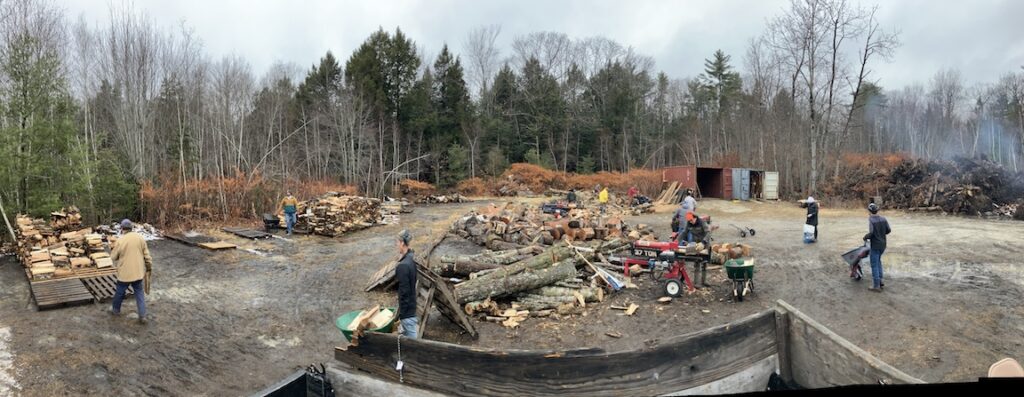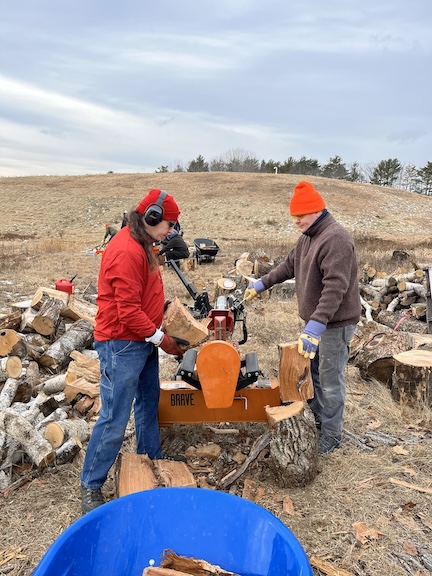By Jordanna Feely and Rebecca Rundquist
Much like food banks, firewood banks are designed to meet a basic human need: in this case, it’s warmth during the cold season. Firewood banks can provide a safety net for people in Maine who rely on heating their homes with wood but find themselves suddenly unable to access a supply for a variety of reasons.
Maine is seeing a steady increase in volunteer-run wood banks that efficiently use local resources to make sure their communities are warm. The first Maine wood bank was established in Cumberland, Maine, in 2007 by Bruce Wildes and Rev. Diane Bennekamper. There are now 11 wood banks, which provided an average of 63 cords each in 2024. The difference between 5.5 cords delivered by one wood bank and 165 cords by another depends on a number of factors, including the volunteers splitting the wood and the number of months per year that a wood bank operates.
Wood banks operate on principles of community generosity, where wood is typically donated, harvested from fallen trees, or sourced through sustainable forestry practices. Wood bank volunteers will often pick up the donated wood and bring it back to a municipal, private, or residential wood lot for processing, and then the wood is either delivered to families or picked up by those in need. Some wood banks purchase their wood from donated funds.

With 10% of Maine families living below the federal poverty level and heating costs consuming 25% of their income, wood banks can play a big role in addressing the needs of Maine’s communities. The University of Maine’s National Wood Bank Project, led by Dr. Jessica Leahy, recently completed a statewide wood bank demand analysis, available at Fogler Library’s Digital Commons, which discovered that 63 communities across Maine have potential demand for wood banks. Oxford County led the state with eight towns with potential demand.
Leahy reported, “There are clusters of towns where wood bank demand concentrates, like the communities stretching between Dexter to Monson. Monson is, in fact, a great example where a wood bank would be ideal. Over 1 in 3 households heat with wood and more than a quarter of the households have housing costs of 35 percent of their income or more.”
Currently, 50% of all Maine households use firewood for some or all of their heating needs and 10% heat their homes exclusively with wood. A family who primarily heats their home with wood usually burns between two to seven cords over the winter, depending on the size of the home and other factors. Maine has the advantage of having ample sustainable wood resources, with 89% of the state in forested land.
One question for wood banks is whether their role is to act as an emergency bridge or a regular, long-term solution for the households they serve. Either way, an important factor is that there are no barriers to support Maine families in need. Often, the wood bank requests come in while families are waiting for Low Income Home Energy Assistance Program (LIHEAP) or General Assistance administrative processes to be completed. In other cases, a sudden medical expense or other life challenge has created an emergency need for support.

A critical value of small community wood banks is that they are built on community relationships aware of those in need. The hope is that those needing assistance can potentially give back later through donating time or funds, or by simply helping others in some way following their own fuel insecurity crisis. Sometimes wood banks get calls for assistance from a person saying they are worried that their neighbor may be in need of wood.
“A wood bank is a valuable resource for a community where low-income families often face a ‘heat or eat’ dilemma. By providing access to free firewood, we can help folks stretch their budgets without worrying about staying warm,” said Bob MacGregor, founder of the Waldo County Woodshed.
One challenge is access. There is a disconnect between Maine communities with a high use of wood as a primary energy source and the location of wood banks throughout the state. Most of Maine’s wood banks are located along the coast. However, there is a great deal of need inland. To address this, four volunteers started a nonprofit, Maine Wood Banks, to create a network of existing and new wood banks statewide. The Midcoast and newly created Freeport wood banks are the inaugural members of the network.
One goal of Maine Wood Banks, in partnership with University of Maine School of Forest Resources, is to create a “wood-bank-in-a-box” framework. This guidance provides support to start and manage a wood bank, addressing both the operational and business aspects of a wood bank, such as insurance questions and funding. A statewide network also provides the opportunity to share information, best practices, and equipment among wood banks. There is no one-size-fits-all model to fuel assistance because it is built based on the community it is serving.
The U.S. government has acknowledged the potential importance of wood banks in communities by including $8 million for wood bank investment in the Infrastructure Investment and Jobs Act passed in November of 2021. These funds are administered through the Alliance for Green Heat, which has helped 38 wood banks get started across 22 U.S. states.
To date, Alliance for Green Heat has contributed $27,000 to establish three wood banks in Maine, with an additional $80,000 given to existing wood banks to assist with ongoing operations. One of the recent grantees is the Freeport Wood Bank, founded by Freeport resident Tony DiMarco, which benefited from a $10,000 start-up grant that assisted with the purchase of equipment, paid for liability insurance, and created community awareness through a website and other marketing materials.
Wood banks are more than just a source of warmth during Maine’s harsh winters; they are a testament to the power of community-driven solutions. By addressing both immediate needs and long-term sustainability, wood banks embody resilience and collective care in action. They help alleviate the financial burden on families struggling to heat their homes, strengthen local connections, and promote responsible resource use.
As Maine continues to expand its wood bank network, the efforts of volunteers, nonprofits, and academic institutions highlight how innovative collaborations can combat fuel insecurity effectively. With support from government initiatives, such as the Infrastructure Investment and Jobs Act, the future of wood banks looks promising.
For those in need, for those who wish to give back, or for communities looking to build their own wood banks, the message is clear: together, we can create a warmer, more connected future.
For more information about wood banks in your community or how to start your own, visit woodbanks.org.
Jordanna Feely helped establish the Maine Wood Banks nonprofit and is serving as its board treasurer. She lives in Freeport, Maine, and was involved with setting up the Freeport Wood Bank. Rebecca Rundquist leads the Cumberland Wood Bank in addition to helping the University of Maine School of Forest Resources as the temporary wood bank outreach coordinator. She is also one of the founders of Maine Wood Banks. She lives in Yarmouth, Maine.
This article originally appeared in the spring 2025 issue of The Maine Organic Farmer & Gardener.
